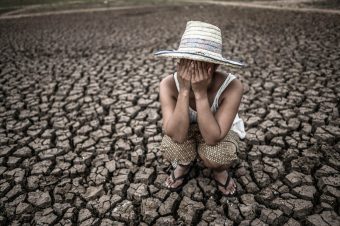
Daily media reports bring news of extreme weather conditions, natural disasters, loss of biodiversity as well as growing concerns about food security and numerous other adverse situations facing humanity. The reactions to this information are different – some ignore it or treat it indifferently, others feel concerned, while some cause more intense feelings.
If you’ve felt intense fear and anxiety while reading articles like this, you may be experiencing climate anxiety. Although climate anxiety involves feelings of dread and uses the term anxiety, it is different from ordinary anxiety. While normal anxiety is often about worries and fears that can be irrational or partially irrational, climate anxiety is based on the real threats that climate change brings us. As the impact of climate change on mental health is still not sufficiently researched, the previously written is very important for experts to lay the foundations for solving this problem that people are facing.
I want to insert a digression here. In a global survey conducted in 2021, it was shown that young people are most concerned about climate change, and if we look at this category, as many as 60 percent of young people between the ages of 16 and 25 expressed concerns that affect their everyday lives.
Let’s get back to the main thread of the text. It is very important to understand the difference between the mentioned two anxieties because it significantly affects the approach of experts in conversation and therapy. In common anxiety, a professional should recognize which fears are unfounded and help to replace them with a healthier way of thinking. On the other hand, climate anxiety is recognized as a healthy response to a real threat, which is why feelings of sadness, fear, and anxiety are not unfounded.
These feelings can have a profound effect on young people’s daily lives, causing feelings of sadness, helplessness, or anger. Many young people express a sense of injustice and anger towards older generations who have not taken enough action against climate change. Such feelings can lead to depression, sleep disturbances, reduced concentration, panic attacks, and obsessive thinking.
The approach in such situations should include understanding and accepting the person’s feelings, instead of denying them. Professionals should provide support by developing emotional and mental strategies to cope with the challenges brought about by climate change.
Below I will present several coping strategies that experts have highlighted. However, it should be emphasized once again that the impact of climate change on mental health has not yet been sufficiently researched, and that the strategies have not been perfected. They represent different ways in which individuals can manage their anxiety. Each has its advantages and disadvantages, and their effectiveness depends on several factors that can also be influenced to improve the outcome.
The first strategy is aimed at taking specific actions that can contribute to solving the problem of climate change. It includes learning about climate change, adopting environmental habits, and participating in activities that help reduce harmful emissions. Through this strategy, individuals are enabled to focus their energy on positive activities that can make an impact, leading to a sense of control, purpose, and hope. However, there is also the possibility of a feeling of helplessness because the individual realizes that not all control is in his hands and that he cannot contribute enough. As explained, it is necessary to find a balance between goals and expectations. Setting smaller goals that are realistic to achieve and celebrating success can help with motivation.
Another strategy relates to ignoring or denying climate change. This can temporarily relieve a person of anxiety, which is sometimes necessary. However, if we look at the long term, including if all people turn to this approach, climate change will become even more intense. It is good to develop such a strategy for temporary relief, but in the long term, it is important to work on other methods as well.
Thirdly, trust in social power, i.e. institutions, organizations, and social collectives, to work on solving the problem of climate change is mentioned. The good side of the strategy is that it creates a sense of hope and motivation because the importance of both one’s own and collective efforts is recognized. However, if an individual relies only on faith in social power, he may experience disappointment, due to a certain failure. That is why one should work on maintaining a positive attitude, that it is important not to give up, but also that significant results cannot be achieved overnight.
Each of us faces different emotions when it comes to climate change. As a journalist dedicated to ecology and a person for whom nature is important, I also go through moments of hope and doubt about the meaning of my work. What helps me in difficult times is knowing that I am not alone in my feelings and that other people feel similar concerns. This is encouraging because worry can be a trigger for motivation and action. Therefore, it is important that we openly discuss our fears, jointly recognize the problem, and look for solutions for positive changes.
